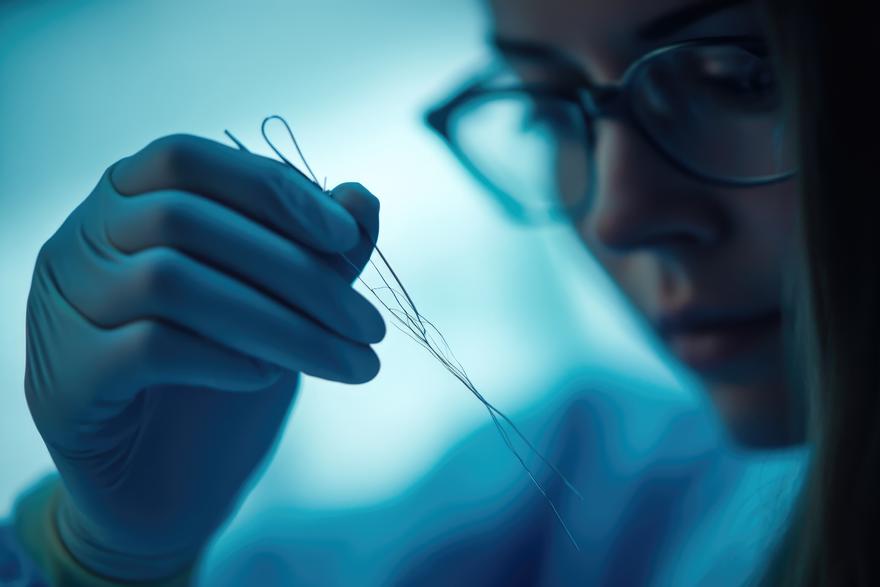Your Hair Doesn’t Lie: What an Epigenetic Hair Analysis Can Tell You About Your Health That Blood Tests Don’t

You’re exhausted, anxious, foggy and yet your blood work says everything is “normal.”
I hear that from women all the time. You’re trying, you’re doing what you can, but your labs come back clean and you’re left wondering what’s really going on.
You’re not imagining it. You’re just looking in the wrong direction.
That’s where the epigenetic hair test comes in. Instead of checking minerals or metals, this test examines how stress and lifestyle have switched your genes on or off through DNA methylation patterns.
This type of testing can reveal how your body is managing stress, inflammation, detox, and even cellular aging, all from a tiny strand of hair. It goes beyond the moment-in-time snapshot of blood work to show what’s been happening behind the scenes over weeks or months.
In this post we’ll explore how Epigenetic Hair Analysis works, what it can tell you, and why it may be the missing piece if you’ve been struggling with fatigue, anxiety, or brain fog, despite “normal” labs.
What Is Epigenetic Hair Analysis?

Epigenetic Hair Analysis looks at the chemicals attached to your DNA (called epigenetic markers) to see how your genes have been reacting to stress, toxins, sleep patterns, and nutrition.
Unlike genetic tests that look at your inherited code, this is about how your environment and lifestyle are talking to your genes in real time.
The hair follicle is rich in cellular material, making it one of the most reliable places to observe how lifestyle and environment are affecting gene expression over time.
It measures methylation at specific gene sites related to things like hormone balance, detox pathways, inflammation, and cellular repair, giving insight into how your entire body is managing internal and external stress.
You collect a sample of fresh, uncolored hair close to the scalp, making sure to include the hair bulb, where the living part of the strand holds the most accurate data for epigenetic analysis.
The lab evaluates DNA from the hair bulb, the living part of the strand that holds valuable information about your epigenetic mapping.
This hair scan analysis can detect how epigenetic factors, like chronic stress or environmental toxins, may be disrupting your body’s ability to maintain optimal health.
Epigenetic Hair Analysis is a powerful tool, especially for those of us who feel stuck in chronic stress, hormone imbalances, cognitive fog, or have a history of environmental exposure (like mold or toxins). It reveals how your cells have been adapting and whether those adaptations are helping or holding you back.
What Can Epigenetic Mapping Tell You That Blood Work Can’t?

Most lab tests tell you what’s happening right now like your current hormone levels, vitamin status, or markers of illness.
Epigenetic hair testing goes deeper.
It shows how your body has been adapting over time and whether that adaptation is helping or holding you back.
Whether you're dealing with lingering symptoms from mold, burnout, or simply navigating an overload of environmental factors, this test shows how your body has adjusted and what kind of support it needs to move toward balance and optimal health.
You’re constantly tired, but your labs look “normal.”
Epigenetic patterns can show how your cellular energy systems are functioning; if your body is in repair mode, stuck in stress response, or burning through resources faster than you can replace them.
You’ve cleaned up your diet and lifestyle, but still feel inflamed.
This type of testing can pinpoint persistent immune response activity and inflammation at the cellular level, even when traditional markers don’t show anything abnormal.
You’ve had mold exposure or chronic stress and you feel like you’ve never fully recovered.
We can see how your nervous system, detox pathways, and genes linked to stress response are functioning now, not just what you inherited. That’s powerful, especially if your body’s been stuck in fight-or-flight for too long.
You want to support your body, but don’t know where to start.
Rather than throwing supplements at symptoms, this gives us a personalized roadmap that takes all these factors into account like your stress load, immune health, sleep quality, nutrition, and more.
Your test results may guide us toward supporting detox pathways, inflammation control, or replenishing things like amino acids, fatty acids, and antioxidants based on what your body is actually asking for.
Epigenetic hair testing gives you insight into how your body has been adapting, protecting, and compensating behind the scenes, sometimes for years.
Signs You Might Benefit from a Scientific Hair Analysis
If you’ve ever left an appointment with a clean bill of health but still felt off, you’re not alone. Standard labs don’t always explain what your body is trying to tell you. That’s where this kind of testing can offer deeper insight.
One thing I see often is persistent anxiety or tension that doesn’t match your external circumstances. Your nervous system may be stuck in overdrive, and your stress-response genes may be expressing in ways that leave you feeling wired, foggy, or emotionally exhausted.
For others, it’s fatigue that lingers no matter what you do.
You’re eating well, sleeping as best you can, moving your body but you still feel drained and scattered. Epigenetic testing helps us identify whether your immune system, cellular repair, or inflammation pathways are working against you instead of for you.
It’s also helpful for anyone with a history of mold exposure, chronic stress, or environmental sensitivity.

After Hurricane Harvey, I began digging into tools like this for my own recovery. It finally gave me language for the “off” feeling I couldn’t explain and it’s become one of my go-to tools for clients with complex, unexplained symptoms.
If you rely on caffeine to function, feel overstimulated or disconnected, or sense that something’s not right even though your labs say otherwise, this kind of testing helps us see what’s going on beneath the surface.
Your symptoms are often the result of real, measurable shifts in gene expression and epigenetic factors caused by long-term exposure to stress, toxins, poor sleep, nutrient imbalances, and even fatty acid deficiencies.
How the Hair Testing Process Works at Hill Family Wellness

Getting started is simple. Once we decide this is the right next step for you, we’ll send a kit straight to your home. Inside, you’ll find everything you need to collect a small sample of clean hair from close to the scalp.
Just follow the instructions, use the tweezers to collect the hair samples, tape them to the card that then goes into the pre-paid envelope. That’s it.
Your samples are then analyzed by a lab that specializes in epigenetic scanning. This isn’t the same as hair follicle drug testing or mineral analysis.
The lab performs a hair scan to extract and decode epigenetic markers, revealing how your current environment and lifestyle are shaping your gene expression.
When your results are ready, we’ll meet to go over everything together, either virtually or in person. I’ll walk you through what your epigenetic report shows, how it may relate to your current symptoms, and what steps we can take to support your body’s ability to self-correct.
These insights allow us to tailor a wellness plan that takes your environmental factors into account, not just your symptoms.
This kind of testing often becomes a turning point in care, especially for clients enrolled in my programs like Anxious to Thriving or Thrive Well Labs. It gives us the insight we need to stop chasing symptoms and start supporting your body in ways that actually create momentum.
And the best part? It’s non-invasive, affordable, and done entirely from the comfort of your home.
What to Expect After Your Epigenetic Hair Test

Hair testing is just the beginning. The real transformation happens in how we use the results.
The lab sends me a multi-page report that outlines your epigenetic patterns in detail. We’ll see everything from stress response and inflammation to detox efficiency and cellular repair. Once it’s in, I take time to review it through both a clinical and personal lens.
Rather than just asking what's wrong, we look at how your body is responding to everything it’s been carrying.
How is your body adapting to stress? Is your detox system keeping up? Are your genes expressing in ways that support resilience or reflect long-term strain?
This kind of testing can help explain why you're dealing with lingering fatigue, chronic inflammation, brain fog, or poor stress recovery, even when other labs haven’t found a clear cause. The answers often lie in how your body has been compensating behind the scenes.
Interpretation is key.
A report on its own doesn’t change your health, context does. As a nurse practitioner, functional wellness coach, and someone who’s personally recovered from mold toxicity and nervous system dysregulation, I bring both experience and insight to help make sense of what your body is communicating.
From there, we create a plan that reflects your unique picture.
For some, it’s nervous system support. For others, we focus on inflammation, mitochondrial repair, or reducing epigenetic stress signals. I may also recommend tools like neurofeedback, mindfulness practices, or specific nutrition strategies based on your body’s current needs.
Frequently Asked Questions About Epigenetic Hair Analysis

Is this the same as hair follicle drug testing?
No. This is a completely different type of testing. Epigenetic analysis doesn’t check for drug use or substances in your bloodstream. Instead, it looks at patterns in your DNA that show how your body is adapting to stress, inflammation, toxins, and lifestyle influences over time.
What makes this different from other types of hair testing?
Unlike hair mineral analysis or drug testing, this is an epigenetic hair follicle test. It uses a hair scan to identify specific epigenetic markers that show how your lifestyle, nutrition, and environmental factors are influencing your gene expression right now.
Epigenetic testing helps us understand how real-life inputs influence gene expression in ways that impact your mood, metabolism, and resilience.
Can I do this test if I’ve colored or treated my hair?
Yes. Ideally, we use a small sample of uncolored hair from near the scalp, but if your hair is treated, we can still move forward. I’ll walk you through how to collect the sample correctly so we get an accurate read.
Is it safe for kids or teens?
Yes. The test is completely non-invasive and safe for children. It can be especially helpful when symptoms like brain fog, fatigue, or focus issues don’t have a clear explanation from standard labs.
How often should I retest?
Most clients benefit from retesting every 90 to 120 days. That gives us enough time to make changes and track shifts in your gene expression and cellular response. Hair growth rates vary slightly, but this window provides reliable insight into ongoing patterns.
Hair growth rates vary slightly from person to person, but retesting every 3–4 months gives us the most consistent insight into changes in gene expression and internal stress patterns.
Is this covered by insurance?
No. Like most functional lab testing, this is an out-of-pocket investment. However, it’s often more affordable than traditional panels and gives us highly individualized information that typical lab work can’t provide.
How long does it take to get results?
Once your hair sample is sent to the lab, results are typically ready in about 1 to 2 weeks. As soon as your report is in, we’ll schedule a session to review it together and map out your next steps.
While this test isn’t used to diagnose disease, many medical professionals and functional providers use it as a powerful tool for personalizing care and guiding long-term wellness plans.
Final Thoughts: Stop Settling for “Normal”

ou don’t need another lab report telling you everything looks fine when you feel anything but.
Fatigue, anxiety, brain fog, burnout, sensitivity are signals. Your body has been trying to get your attention, it’s time to listen.
Epigenetic hair analysis gives us a deeper view of what’s happening beneath the surface. It shows how your body has been adapting to stress, environment, and lifestyle and whether those patterns are helping or hurting your healing.
This test is simple, affordable, and non-invasive. But more importantly, it helps us stop guessing and start making decisions based on what your body truly needs.
You deserve more than “normal.” You deserve clarity, direction, and real support.
Curious if this type of testing is right for you? Let’s talk.
Disclaimer: The Epigenetic Hair Analysis from Cell Wellbeing is not FDA-approved and is not intended to diagnose, treat, cure, or prevent any disease. It is for informational and wellness purposes only.

